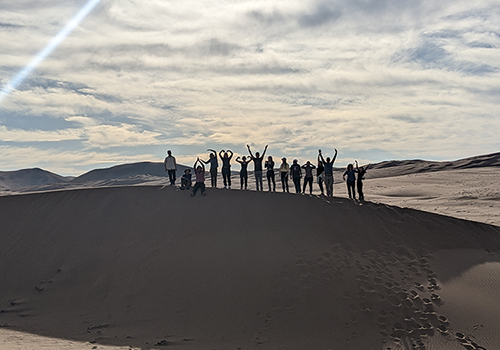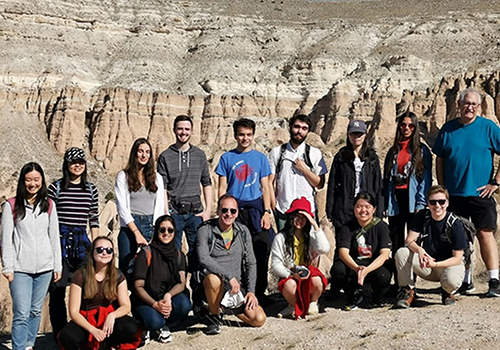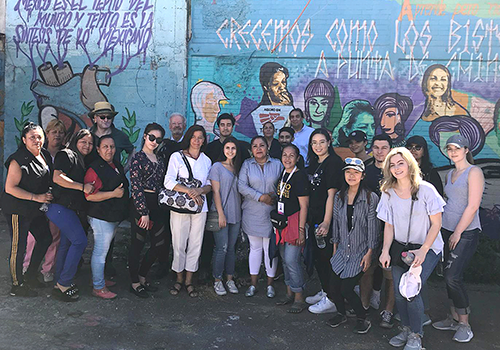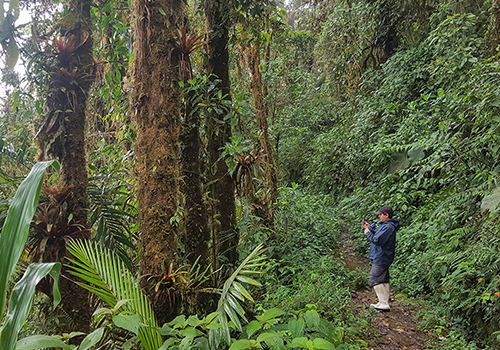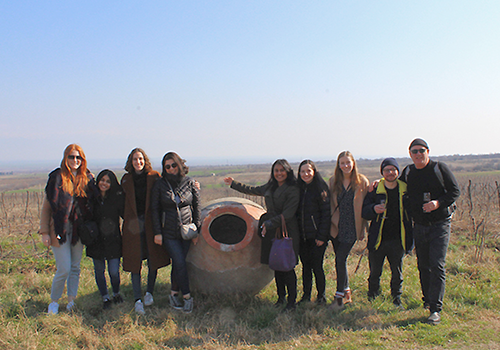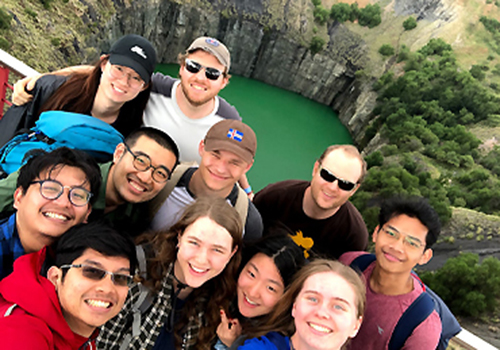
Spend Reading Week Travelling & Learning
International Course Modules are a great way to enhance your course learning by participating in an international experience. In each 0.5 or 1.0 credit course, a small number of students can travel outside Toronto for immersive, course-related, faculty-led experiences during either the Fall or Winter Reading Week. The Faculty of Arts & Science covers travel and living expenses for students and faculty members.
International and Indigenous Course Modules have been separated into two distinct programs. Click here for information about Indigenous Course Modules.
Benefits of International Course Modules
By participating in an International Course Module, you can:
- Strengthen your ability to draw connections between theoretical course concepts and your international experience
- Gain a deeper understanding of complex concepts, ideas, information and perspectives
- Gain meaningful experiences that can help with your applications for jobs, graduate studies, professional faculties and volunteer roles
- Bond with fellow students and instructors and build a stronger network of professional support
Who is Eligible to Participate?
Courses with International Course Modules are open to students in any year. To be eligible, you must be:
- A full-time undergraduate degree student in the Faculty of Arts & Science — St. George campus (exchange or non-degree students are not eligible to receive funding)
- In good academic standing
- Enrolled in the course that offers the International Course Module
Is There an Additional Cost?
International Course Modules are covered through your regular tuition fees. Students are required to contribute $200 to help offset travel costs.
Courses with International Course Modules
| Course | Instructor | Description | Location | Travel Period |
|---|---|---|---|---|
| DRM386: African/Diaspora Pop Culture |
Africa’s popular culture in music (Afrobeats and Amapiano) as well as viral dances and memes have become globally pervasive. From its protest enactments against apartheid to the more recent multicultural variants, South Africa has produced Trevor Noah and Tyla, globally renowned for their comedy and songs. As part of the coursework in DRM386, the ICM component will enable students to undertake a 5-day field trip to South Africa, to interact with students and renowned academics, like Samuel Ravengai and Mark Fleishman (whose works we are studying) at Wits and UCT, and a tour of performance sites and museums in two cities. |
Izuu Nwankwo | J'burg & Cape Town, South Africa | Fall 2025 Reading Week |
|
ESS445: Global Tectonics ESS441: Advances Structural Geology |
This ICM trip will explore the unique landforms, tectonics, and human activities of Southern and Central Anatolia (Turkey). Anatolia has important active tectonics and surface processes that students can only fully appreciate with a field visit to specific geological field sites there. In addition, the past and present-day human life in the region is intricately linked to the regional geomorphology and geology: e.g., vast underground cities were carved into the soft volcanic tuffs and inhabited at stages from Hittite to early Christian times; fluvial valleys sheltered communities of early Greek and Christian monasteries; local volcanic activity shaped the mythos of civilizations indigenous to the region; earthquake seismic activity continues to threaten human settlement in Anatolia. |
Russell Pysklywec and Tasca Santimano |
Istanbul, Turkey | Fall 2025 Reading Week |
| POL358: Conflicts, Minority Rights and Para-States in Europe | POL358H examines conflicts and para-states in the European Union’s (EU) backyard. As EU enlargement continues, the European Commission has confirmed that it will be importing any bilateral conflicts into the Union. That said, what happened in Cyprus in joining the EU as a divided island in 2004 cannot happen again. The course primarily examines a number of unresolved issues in Europe that are largely shaped by real and perceived shortcomings in minority rights. After a section on Roma Rights in Central Europe, our focus turns to the origins and outcomes of largely separatist wars in Azerbaijan, Cyprus, Georgia, Moldova and Ukraine and the peace agreements that followed. Of particular focus is the role of the EU within the framework of European Neighborhood Policy (ENP) and the Eastern Partnership (EaP), Russia and the United States and the paths to something more than the ceasefires that are now in place. The ICM allows students to pursue an independent research project in Georgia related to conflict resolution, its Euro-Atlantic integration or its relationship with the Russian Federation. | Robert Austin | Tbilisi and Signagi, Georgia | Fall 2025 Reading Week |
|
ESS261: Earth System Evolution ESS224: Introduction to Mineralogy and Petrology ESS423: Mineral Deposits ESS322: Igneous Petrology |
Southwest Britain has a wide variety of excellent geological formations including ophiolite complexes, world class tin deposits, and well-preserved pillow basalts not found in Ontario, giving students the opportunity to better understand the formation processes of these rocks. Further, students will be able visit the birthplace of Paleontology on the Jurassic coast. Students will also experience cultural activities, including going to the Natural History and British museums and will have the opportunity to interact with local British geology students from the Camborne School of Mines who will join us on some of the field expeditions. |
Daniel Gregory, Neil Bennett, Melissa Anderson, Carl-Georg Bank |
Southwest UK | Winter 2026 Reading Week |
| HMB323: Global Health Research |
The course module will offer practical opportunity to observe major health concerns in Greece, currently magnified by the double burden of the economic crisis and ongoing influx of migrants fleeing strife in Africa, Asia and the Middle East. The students will be introduced to local efforts aiming to meet the health challenges, including research at local universities, healthcare delivery at public hospitals, activities of grassroots organizations (e.g. NGOs and solidarity movements) and innovative health tech start-ups, as described in the itinerary. The students will explore the sociopolitical context of global health in Greece and align the goals of the course module to course-specific objectives. In each of the years of the course module, the students will undertake a research project which extends the work from the previous course module. |
Maria Papaconstantinou & Helen Dimaras | City Athens, Greece | Winter 2026 Reading Week |
| Course | Instructor | Location |
|---|---|---|
| AMS310H1 - Approaches to American Studies | Leah Montange | San Diego & Los Angeles, USA |
| AMS330H - Transnational America | Leah Montange | Southern California, US |
| ANT319H1S - North American Archaeology | Katherine Patton | New Mexico |
| ANT317H - Archaeology of Eastern North America | Katherine Patton | Ohio, US |
| EEB384H - Diversity of Amphibians and Reptiles | Luke Mahler | Yasuni & Yanayacu, Ecuador |
| CAS400Y1Y - Capstone Seminar – Critical Perspectives on Asian Modernity | Rachel Silvey | Singapore |
| CRI427H1S - Organized Crime and Corruption | Matthew Light | Mexico City |
| ESS221H1F - Minerals and Rocks | Grant Henderson and Russell Pysklywec | Central Turkey (Cappadocia, Nevsehir, Goreme—A UNESCO Geological World Heritage Site), Istanbul |
| ESS222H1S - Petrology & ESS423H1S - Mineral Deposits | Xu Chu and Daniel Gregory | South Africa |
| ESS223H - Earth Materials & ESS445H - Global Tectonic | Grant Henderson and Russell Pysklywec | Central Turkey (Cappadocia, Nevsehir, Goreme—A UNESCO Geological World Heritage Site), Istanbul |
| ESS423H - Mineral Deposits & ESS322H - Igneous Petrology | Daniel Gregory and Corliss Kin I Sio | Chile |
| HMB323H1S - Global Health Research | Helen Dimaras and Maria Papaconstantinou | Athens, Greece |
| HMB440H1S - Dementia | Franco Taverna | The Netherlands |
| POL359Y1Y - Enlarging Europe: The European Union and its Applicants | Robert Austin | Tbilisi and Signagi, Georgia |
Dates and Application Process
Before the travel period, you will need to do the following:
- Attend orientation sessions with your professor and U of T staff
- Complete Safety Abroad requirements if travelling outside of Canada
- Prepare travel documents as required, well in advance. You are responsible for ensuring you have valid travel documents, such as a passport and visa, to enter and exit the destination. The costs associated with travel document applications are not funded by the university. Contact Professional and International Programs, Woodsworth College (pip.international@utoronto.ca) if you need a supporting document for your travel document application.
- Complete immunizations and travel documents as required. Check whether there are required and recommended vaccinations on the Government of Canada Travel Vaccinations page. You should also check with a health care provider as soon as possible regarding vaccinations or other health concerns. Vaccinations are not funded by the university.
Refer to the list of International Course Modules above and enrol in the courses before the deadline to enrol in courses.
In some courses, there might be an additional application to participate in the course module. The course instructor will share those details in the class.
Priority will be given to students who previously have not received funding from the following A&S experiential learning programs: International Course Modules, Indigenous Course Modules or the Research Excursions Program.
If you require accommodations, please contact Accessibility Services and the Experiential Learning and Outreach Support office (experiential.artsci@utoronto.ca) well in advance of the trip to identify and develop any necessary accommodations.
Participation in International Course Modules should not impact your progress or ability to meet deadlines in other courses.
Please contact the Office of Experiential Learning and Outreach Support (experiential.artsci@utoronto.ca) if you have any questions.
International Course Modules in the News
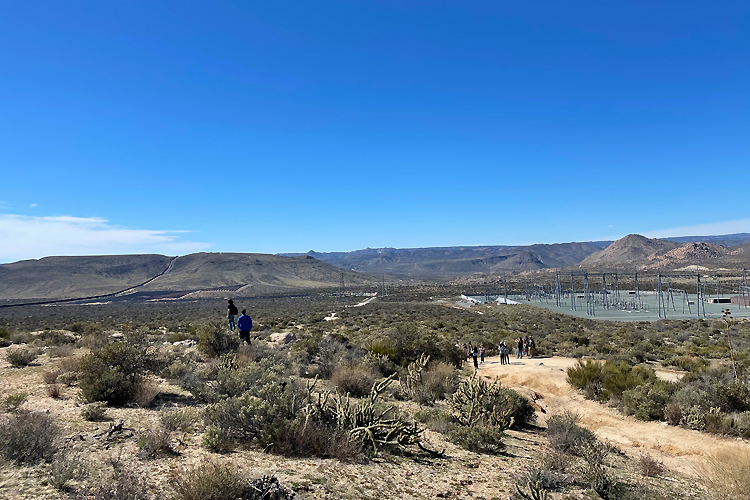
As part of the Transnational America International Course Module, Professor Leah Montange and her class travelled to California to experience spaces that have been shared through transnational forces such as political, economic, religious and cultural forces. The group looked at Los Angeles’ shipping port and the supply chain and learned about migrant workers.
Read more about their experience: A remarkable field trip shows students a different side of California
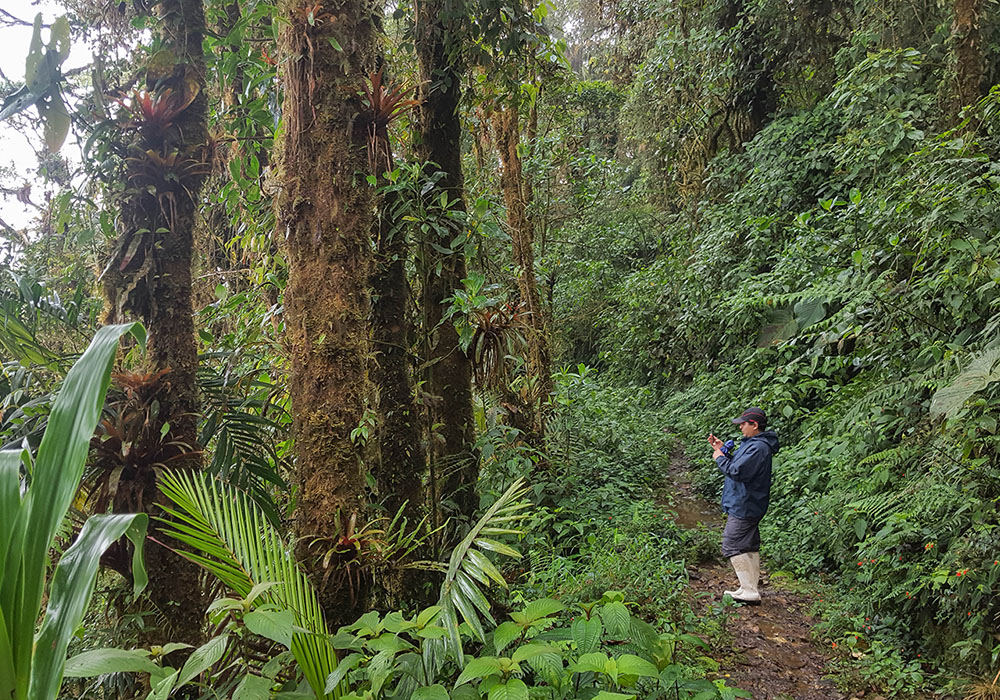
In the Diversity of Amphibians and Reptiles course, Professor Luke Mahler took 14 U of T students to Yasuni National Park in northern Ecuador to spot and study inhabitants of the rainforest. For these students, seeing the bright blue eyes of a rarely seen banded tree anole lizard staring down at them was unforgettable. They also met members of the Huaorani tribe (an especially reclusive community), saw a dwarf caiman (like an alligator) swimming in the Tiputini River and explored the ecosystem of the Andean cloud forest — something few people in the world get to do.
Read more about their experience:Exploring rainforest trails and career paths in Ecuador


